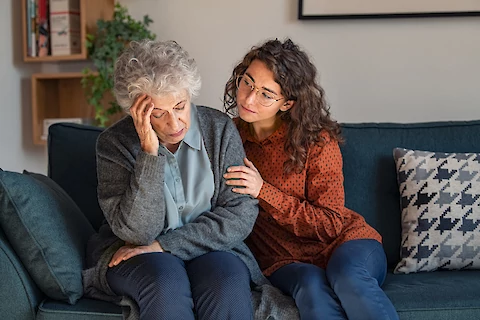
Balancing Caregiving and Mental Wellness: Respite Care for Family Caregiver Support
Caregiving is a labor of love, but it can also be incredibly challenging and emotionally taxing. Whether caring for an aging parent or a loved one with a chronic illness, family caregivers often find themselves juggling the demands of their caregiving role with their own physical and mental well-being. The stress, fatigue, and emotional toll can accumulate over time, leading to mental wellness issues such as anxiety, depression, and caregiver burnout.
In-home respite care is a valuable solution to address these challenges, offering much-needed relief and support for family caregivers while promoting mental wellness.
Respite care can help in the following ways:
Temporary Relief: Providing family caregivers with scheduled breaks offers them a chance to rest, recharge, and regain their strength. These temporary respites can be as short as a few hours or extend to several days, depending on the caregiver's needs.
Reduction of Stress: Caring for a loved one is certainly rewarding but it can also be a source of immense stress and anxiety. The primary benefit of respite care is that it allows caregivers to take a break from their caregiving responsibilities and step away from the caregiving role, reducing the constant worry and emotional strain that can lead to mental health issues.
Time for Self-Care: Caregivers often neglect their own self-care while focusing on their loved ones' needs. In-home respite care enhances the caregiver's quality of life by providing them with the opportunity to focus on self-care, personal interests and hobbies, spending time with other family members and friends, or simply taking time to relax and rejuvenate.
Prevention of Burnout: Caregiver burnout is a significant concern, and it can have serious consequences for both the caregiver and the care recipient. Respite care acts as a crucial preventative measure to provide family caregivers with regular breaks, lowering the risk of burnout by getting them the rest they need.
Improved Mental Health: When caregivers have the chance to take some time to address their own needs, it can positively impact their mental health. They can experience reduced anxiety and depression, leading to an overall improvement in their emotional well-being.
Quality Time with Loved Ones: Respite care allows caregivers to spend quality time with other family members, friends, or partners. This can strengthen relationships and provide emotional support, reducing feelings of isolation or loneliness.
Peace of Mind: Knowing that their loved one is in capable hands can provide caregivers with peace of mind. This reassurance can alleviate concerns and allow caregivers to fully enjoy their break without worrying about their loved one's well-being.
Increased Effectiveness: Regular breaks through respite care can actually make caregivers more effective in their caregiving roles. When they are well-rested and less stressed, they can provide better care for their loved ones.
Reduced Caregiver Guilt: When caring for a loved one, it is common for family members to often experience guilt when they take time for themselves. Respite care can help reduce this guilt, as caregivers come to understand that they deserve and need breaks to provide the best care possible.
Professional Support: Caregivers from companies like Senior Helpers are trained professionals who can offer specialized care tailored to the needs of the care recipient. This ensures that the family can trust that their loved ones are receiving the best care possible, which can reduce anxiety and stress.
Customized Care Plans: Respite care plans are tailored to the specific needs of the care recipient, ensuring continuity of care and a seamless transition between the caregiver and the respite care provider, which can reduce anxiety for both parties. In fact, caregiver support is a core pillar of Senior Helpers’ LIFE Profile assessment, which enables us to address the individual needs of the care recipient, as well as the availability of resources and care from family and the community, leading the way to better outcomes for our clients.
Respite care is a lifeline for family caregivers who are facing the daily challenges of caregiving. By providing temporary relief, professional assistance, and opportunities for self-care, it not only supports the caregiver but also promotes mental wellness. Caregivers deserve the chance to tend to their own well-being while continuing to provide their loved ones with the best care possible. Taking advantage of the Senior Helpers’ respite care services provides a path towards balance, mental wellness, and a sustainable caregiving journey. Caregivers should recognize that seeking respite care is not a sign of weakness but a necessary step to ensure the well-being of both themselves and their loved ones. Contact us today to learn more and get started.